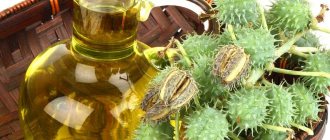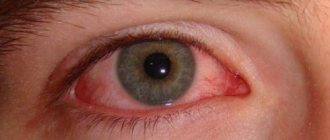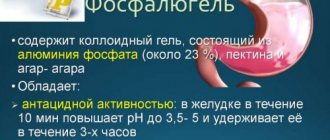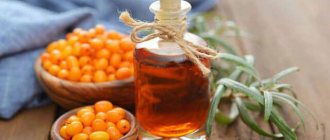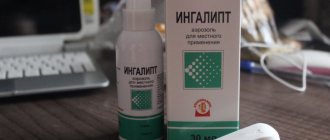September 19, 2018
Averyanova Sveta
Inflamed adenoids cause babies a huge amount of inconvenience and problems. Discomfort in sleep, deafness, decreased mental abilities, chronic rhinitis and otitis as a consequence of advanced disease frighten parents. Thuja oil has become a popular method of treating adenoid hypertrophy in recent years. What are its benefits and how to use it to treat children, we will talk in our article.
What is thuja oil
This remedy is obtained from the cones of an evergreen plant that grows mostly in North America and East Asia. Thuja, which means tree of life in Greek, belongs to the cypress family. The plant is often a shrub, but in rare cases it can grow to a more impressive size. Thuja oil is a homeopathic pharmaceutical preparation and is rightfully considered one of the most toxic esters, which, in fact, does not detract from its unique pharmacological effects.
The product is extracted exclusively by simple steam distillation without lengthy post-processing. Any other method of producing ether is considered unacceptable due to the high toxicity of the starting material. At the same time, some manufacturers carefully clean the aromatic oil from toxic components. It must be said that such esters do not have the full range of beneficial properties characteristic of a regular product.
Indications and contraindications
Thuja oil is prescribed to children for the following diseases:
- I–II degree of adenoid hypertrophy
- otitis
- bronchitis
- sinusitis
- chronic sinusitis
- polyps in the nasopharynx
- cough.
You should not use this natural remedy for the treatment of ARVI, rhinitis, adenoids on your own, without the advice of a doctor, especially in children.
Since thuja oil has several contraindications:
- allergy to essential oils
- pine needle intolerance
- age up to 3 years
- epilepsy.
Important! After the first use of thuja, monitor the child’s condition, even if he has no contraindications to the use of a homeopathic remedy. If you observe redness, swelling, or increased difficulty breathing, stop the course of treatment and seek advice from a doctor.
Beneficial features
The range of healing qualities of thuja is very wide. The ether obtained from this coniferous evergreen plant is able to relieve various types of allergic reactions, as well as alleviate their symptoms. Infusions and extracts of thuja are used for the prevention of cancer . According to some reports, the healing composition is recommended for use in rheumatism. In addition, the use of ether from thuja cones is indicated for women with menstrual irregularities caused by hormonal imbalance. In addition to the above, the aroma oil of the tree of life has the following beneficial properties:
- eliminates congestion in the lungs and bronchi;
- stimulates the immune system;
- normalizes digestion;
- increases potency;
- stabilizes hormonal levels;
- has a healing, astringent effect;
- dilates blood vessels;
- has diuretic, diaphoretic effects;
- eliminates pathogenic microflora in the body.
What is the effect of thuja on adenoids?
People began to use thuja as a medicine from the 15th-16th centuries. For the first time, the effectiveness of evergreen oil was recorded by Christian Hahnemann, who is considered the founder of homeopathy.
Doctors in Western Europe called thuja the tree of life, treated diseases of the respiratory system with pine esters, stopped bleeding, and killed parasites. A recipe was created for making oil from thuja cones by distilling them. The method of extracting useful components has not changed much to this day.
Modern chemical science can, from a practical point of view, explain the usefulness and effectiveness of thuja for the treatment of adenoids. The secret is in the composition of the product. It contains:
- Flavonoids. These natural components have a positive effect on the activity of enzymes and the functioning of the body as a whole.
- Aromatic resin. Makes breathing easier and gives the oil a pleasant fresh aroma.
- Aromadendrin. Contained in thuja leaves. Restores the nasal mucosa.
- Essential oil. Eliminates pathogenic flora in the nasopharynx, relieves swelling.
- Sesquiterpene alcohol.
Constricts blood vessels, normalizes breathing. Calms the nervous system, which has a positive effect on sleep. - Tannins. They have an astringent, anti-inflammatory effect.
- Ascorbic acid, tannin. Act as immunomodulators.
The chemical composition of the extract from thuja cones allows the product to have a positive effect on the body in the following areas:
- reduces the frequency of acute respiratory infections, acute respiratory viral infections;
- relieves nasal congestion, frees up the passages for breathing;
- relieves pain in inflamed nasal passages, nasopharynx, irritated throat;
- normalizes the size of adenoids;
- has a wound healing effect;
- calms the nervous system;
- increases the baby's immunity;
- constricts the vessels of the nasopharynx;
- normalizes the functioning of the body's metabolic systems.
The use of thuja makes it possible to get rid of the consequences of inflammation of the adenoids. Children sleep better, become cheerful and active. The brain does not experience oxygen starvation, so it works actively.
This is interesting! Thuja is a tree from the cypress family. Grows in North America and East Asia. But it is often used as an ornamental plant to decorate public parks, winter gardens, and greenhouses. Today, the main producers of thuja oil are companies from Canada and the USA.
Compound
The instructions for the drug indicate that it contains flavonoids, resins, and tannins. In addition, the product includes saponins, tuin, taxifolin. Thanks to such a rich composition, the ether has a pronounced metabolic effect on the body. The main active ingredient of the medicinal product is Thuja Occidentalis. Among other components of the drug it is worth highlighting:
- aromadendrin;
- pinin;
- ipidacrine;
- sawn
- How to cook pike according to step-by-step recipes at home with photos
- Device for measuring human pressure
- 3 pension supplements that not everyone knows about
Application
The method of using thuja oil depends on the nature of the disease that it is supposed to treat. In this case, the healing composition can be used as one of the components of complex therapy or act as the main means of combating respiratory syndromes. Thus, doctors often recommend using thuja oil for a runny nose instead of other chemical pharmacological drugs.
The natural components of this product, unique in its properties, have pronounced antimicrobial activity, so they can easily cope with almost any infection . To treat snot in children and adults, drop oil into the nasal passages. The procedure must be repeated twice a day. The daily dosage should not exceed 4 drops. In addition, inhalations with thuja aroma oil help relieve chronic runny nose. A similar method of using the drug is also indicated for inflammation of the adenoids and polyps.
As a rule, the solution for inhalation is prepared at the rate of 3 drops of oil per glass of hot water. You should inhale the steam for half an hour without covering your head with a cloth. Thuja oil is used slightly differently for sinusitis. For this purpose, prepare an aroma lamp, to which 3 drops of ether are added. As a rule, this procedure helps to avoid unpleasant rinsing of the sinuses. For diseases of the oral cavity, it is recommended to lubricate the nasopharyngeal mucosa with oil. Otitis and other ear pathologies are treated by introducing cotton turundas soaked in thuja ether into the ear canal.
Thuja occidentalis c6 Granules, bottle, 5 g, sublingual
Indications for use
The key symptoms for prescribing the drug are neuralgia, sometimes accompanied by myoclonus in the affected area; papillomas, polyps, condylomas, atheromas; all symptoms worsen in damp weather; a variety of senestopathies, including: a feeling of “something moving” in the abdomen; a feeling of fragility limbs with fear of fractures. The main cases of clinical application Otorhinolaryngology rhinopharyngitis, recurrent tonsillitis, serous-mucosal otitis, eustachitis and chronic rhinosinusitis, for which various types of therapy were used. The more pronounced tonsil hypertrophy and/or adenoid vegetations are, the more suitable the drug is for children. Pulmonology chronic bronchitis, recurrent bronchitis; asthma. The drug is indicated in cases where deterioration occurs in the cold and wet seasons. Dermatology warts (Thuja ocdentalis is most often prescribed as a basic medicine; depending on the type of wart, the drug is used in combination with one or more symptomatic remedies); papillomas, condylomas; juvenile acne, rosacea, seborrhea; recurrent boils and carbuncles, hidradenitis and others diseases associated with damage to the sebaceous glands and hair follicles; onychopathies (including onychorrhexis, onychoschisis), in which the nails are soft, brittle, covered with grooves and/or grooved; sweating (with profuse or not profuse sweat) with a characteristic odor garlic; chronic eczema with the presence of other signs of the drug. Urology urinary tract infections, chronic or recurrent, in the absence of malformations of the urinary tract, prevention of recurrent interstitial cystitis; prostatic hypertrophy, chronic prostatitis, prevention of relapses of chronic prostatitis; prevention of relapses of bladder polyps; urethral discharge and dysuria after treatment of specific urethritis ( trichomonas, candidiasis, chlamydia, gonorrhea). Gynecology leucorrhoea, chronic metritis; fibroids, uterine polyps (slowing their development and preventing relapses); papillomavirus infection; fluid and sodium retention in the body during pregnancy; cyclic pain in the ovaries. Ophthalmology chronic conjunctivitis, blepharoconjunctivitis; chalazion. Gastroenterology dyspepsia with rumbling and “rumbling” in the stomach. Rheumatology arthralgia, worsened by cold and humidity. Neurology and psychiatry: neuralgia, accompanied by muscle contractions in a painful area; various senestopathies without neurotic or psychotic overtones; reactive depression (psychosomatic); obsessive behavior and fear of getting sick. Other indications of pathology arising from vaccination, antibiotic therapy, hormonal therapy for gynecological diseases, long-term GCS therapy, use of antipsychotics, etc.
Edas-801
This homeopathic drug is widely used in folk and traditional medicine as a universal remedy for treating respiratory diseases. Edas-801 is a green (sometimes yellowish) solution, packaged in dark glass bottles of 15 or 25 ml. The active ingredient of the drug is Thuja Occidentalis. An additional component is olive oil. Thanks to its unique composition, Edas-801 helps to effectively restore nasal breathing and get rid of inflammation of the mucous tissues of the ears and throat .
pharmachologic effect
The use of thuja aroma oil helps eliminate many negative symptoms of respiratory infection and more. The healing composition is characterized by a metabolic immunomodulatory effect on the body. In addition, one of the most important pharmacological actions of this homeopathic drug can be considered the restoration of the biochemical composition of the mucous membranes. In addition, thuja aroma oil has a pronounced vasoconstrictor effect, which helps relieve swelling from the epithelial tissue of the nasal cavities.
Instructions for use Edas-801
The concentration of pure essential oil in medicinal preparations and homeopathic remedies is strictly limited. However, thuja oil Edas-801 should be used with caution. The manufacturer of the product states in the instructions that it can be used both intranasally and externally. In the first case, a small amount of oil is applied to the affected areas of the dermis for various skin diseases at intervals of 2-3 times a day.
Adenoids, chronic sinusitis, runny nose are indications for intranasal use of Edas-801. For this purpose, it is necessary to inject 3-4 drops of thuja into each nasal passage twice a day. If the pathological focus is located in the mouth, it is recommended to lubricate the damaged mucous membrane several times throughout the day until a lasting therapeutic effect appears.
- How to connect to the Internet on Megafon
- The most unfavorable forecast for the coronavirus epidemic has been announced
- What is coronavirus afraid of?
Instructions for use for children
Treatment of young patients with Edas aroma oil should be carried out only after confirmation of the suspected diagnosis. As a rule, a course of treatment for ENT diseases in children is carried out with a 15% composition. If ether is used, it must be diluted with any other vegetable oil, for example, olive, in a ratio of 1:6. The pure product cannot be used: it can cause allergies .
Thuja oil for adenoids for children is instilled 2 drops into each nasal passage twice a day. For diseases of the mouth and throat, a child from six to twelve years old can lubricate the mucous membranes with this composition. Before the procedure, it is recommended to rinse your throat first. In order to improve the functioning of the nervous system, the instructions for the drug advise adding 5 drops of oil to a warm bath, which should be taken for fifteen minutes.
Treatment regimen for adenoids
Doctors recommend long-term therapy for this disease. So, on average, thuja oil should be used for the treatment of adenoids for about 4-6 weeks. At the end of this period, you should take a month's break. During this period, instead of thuja ether, it is allowed to use sea buckthorn oil. The latter has pronounced anti-inflammatory properties, so it is quite capable of temporarily replacing thuja aroma oil. Meanwhile, the instructions for the drug Edas-801 provide the following scheme for its use for the treatment of adenoids:
- Rinse your nose with saline solution.
- Inject 2 drops of Protargol into each nostril.
- After 20 minutes, drop 2 drops of thuja oil into each nasal passage.
Contraindications and side effects
As a rule, Edas-801 does not cause any negative conditions. However, some people may experience individual intolerance to the components of the product, so before using it it is recommended to conduct a skin test for allergies. In addition, patients with acute rhinitis will have to interrupt the treatment course. Due to the fact that the substances contained in thuja aroma oil have a pronounced immunomodulatory effect, the product should not be used by women during pregnancy.
Adenoids and their degrees
Every person has adenoids. They are located in the nasopharynx and protect the body from viruses and bacteria entering the mucous membrane. In adults and adolescents after 15 years of age, adenoids are small in size, in children before puberty they are slightly larger. This is due to the fact that babies are more often attacked by pathogens and are in greater need of protection due to weak immunity.
Against the background of frequent acute respiratory viral infections, acute respiratory infections, and in the presence of pathologies in the development of children of kindergarten or school age, the adenoids become inflamed and close the passage for air.
In this case, the adenoids themselves become a source of disease. Lack of oxygen provokes a lag in mental and intellectual development. With difficulty breathing, the child sleeps poorly, gets sick more often, and becomes physically weaker.
Inflammation of the adenoids is a reason to seek help from an otolaryngologist. After examination and laboratory tests, the stage of development of the disease is determined and a course of treatment is prescribed.
The classification of tonsil hypertrophy is presented in the table (Important! The table can be scrolled left and right on mobile devices):
| Degree | Symptoms | Consequences of lack of treatment |
| 1st degree | Inhaling air through the nose is difficult when lying down, at night. During the day, the child breathes calmly through his nose. | Insomnia, restlessness at night. |
| 2nd degree | Almost complete absence of free breathing through the nose at any time of the day. Night snoring. Sore throat, cough due to mucus draining into the throat. Nasality. | Breathing through the mouth. Physical weakness. Malaise, lethargy. Frequent ARVI. Psychological apathy. Poor performance at school due to illness and brain hypoxia. |
| 3rd degree | One hundred percent obstruction of the nasal passages. Breathing through the mouth is constant, lips hardly compress. Irritation of the throat mucosa. Stopping breathing during sleep. Hoarseness of voice. | Headache. Chronic ARVI, colds, rhinitis. Hearing loss. Purulent otitis. Mental instability, irritability. Low intellectual and physical activity. |
Lack of treatment for adenoids in childhood and adolescence affects the quality of life in the future.
For this reason, parents of constantly ill children resort to classical medicinal methods of therapy and use traditional methods.
Homeopathy, for example, is recommended by doctors who have noticed the positive effects of herbs and oils on the body. Thuja oil for adenoids in children is recognized as an effective treatment method. It is combined with pills and physiotherapy. Prescribed from early kindergarten age.
For what degree of adenoids does your child have, do you use Thuja oil?
- 2nd set 58%, 198 votes
198 votes 58%198 votes - 58% of all votes
- 1st degree 23%, 78 votes
78 votes 23%
78 votes - 23% of all votes
- 3rd degree 16%, 56 votes
56 votes 16%
56 votes - 16% of all votes
- For prevention 3%, 11 votes
11 votes 3%
11 votes - 3% of all votes
Total votes: 343
19.09.2018
×
You or from your IP have already voted.
Price
You can buy Edas-801 at any pharmacy. As a rule, the drug has a mild effect on pathological foci, so it is prescribed without any fear, which cannot be said about pure ether. The latter may only be used under the supervision of a specialist. The average cost of thuja aroma oil from virtual sellers varies from 70 to 100 rubles. per bottle of 15 ml. In Moscow pharmacies you can purchase Edas-801 at the following prices:
| Pharmacy | Price per bottle (r.) | |
| 15 ml | 25 ml | |
| ElissirPharm | 100 | 157 |
| Samson-Pharma | 107 | 158 |
| Mosfilmovskaya | 80 | 120 |
| healthy | 89 | 130 |
| Key | 102 | 152 |
| Green Avenue | 104 | 159 |

